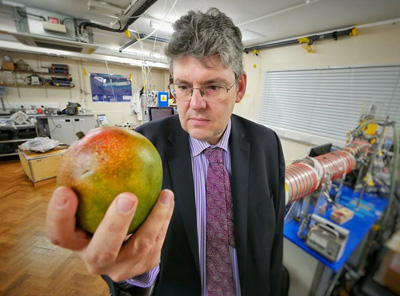Leicester scientists ‘sniff’ out the ripeness of mangoes
Posted: 10 May 2016 | Victoria White, Digital Content Producer | 1 comment
Scientists have discovered a way to ‘sniff’ the ripeness of mangoes by identifying the fruit’s unique chemical signature of ripening…


Scientists from the University of Leicester have discovered a way to ‘sniff’ the ripeness of mangoes by identifying the fruit’s unique chemical signature of ripening.


Lead researcher Professor Paul Monks pictured with a mango. CREDIT: University of Leicester
Lead researcher Professor Paul Monks, of the Department of Chemistry at the University of Leicester, explained: “It is really important for people to be able to tell how ripe fruit is without having to taste it. This is important for fruit producers and supermarkets. Our new published research, from the University of Leicester, has shown that is possible to ‘sniff’ the ripeness of mangoes.
“We used a novel fast-sensitive “electronic-nose” for sniffing volatiles compounds from the ripening fruit. Popular supermarket species of mango were used. In particular, the work showed an increase in ester compounds – the smell of pear drops – was a particular marker of over ripe fruit.”
Assessing ripeness non-destructively
Professor Monks said the work has, for the first time, followed in real-time and detail the chemical signatures of ripening for mangoes.
He discussed how the work could be used by food producers and supermarkets: “There are some real potential applications of this research for making devices to be able assess ripeness non-destructively. The information gained from the work could be used to develop to small, hand-held electronic noses that could be deployed to assess fruit maturity prior to picking and thus determine the optimum point to harvest mature green mangoes.
“This work has great potential for small devices to detect fruit ripeness and could be expanded to a range of different fruits.
“In terms of where we go from here – well we are looking for commercial partners who may be interested in taking these sort of ideas forward.”





Hi Professor Monks,
It seems that mangoes from India and Pakistan are “artificially” ripened by injecting some sort of “chemical”, which could well be carcinogenic. The food agency and perhaps your team should conduct studies to identify the chemicals used, and hopefully prosecute the shopkeepers who import these from the sub-continent.